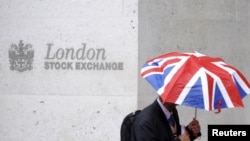Another day, another warning of dire economic consequences for Britain if it decides to leave the European Union in a June 23 referendum.
The head of the Organization for Economic Cooperation and Development said Wednesday that Britain's exit, also known as the “Brexit,” would be a costly mistake that could result in a de facto "tax" on British families.
OECD Secretary-General Angel Gurria said during a news conference at the London School of Economics, "Unlike most taxes, however, this one will not finance the provision of public services or close the fiscal gap. The ‘Brexit tax’ would be a pure deadweight loss, a cost incurred with no economic benefit. ... Britons would be paying it for many years.”
A report from the economic policy organization estimated that the economic blow would amount to 3 percent of Britain’s gross domestic product as a result of what the group said would be a loss of confidence and a rise in uncertainty.
The de facto “tax” Gurria referred to would amount to $3,200 for each British household.
The remarks echoed a recent similar warning by the British treasury. A treasury study this month said the British economy would contract by 6 percent, resulting in an annual loss of $6,200 per household.
Proponents of the Brexit reject the reports as fearmongering and say the savings from no longer paying contributions to the EU alone would offset losses.
In remarks to the Reuters news agency Wednesday, a spokesman for the main Brexit group, Vote Leave, said that “we will be able to cut our tax bill because we will no longer have to fund overpaid and undertaxed international bureaucrats.”
But In his speech, Gurria said the savings from no longer paying into the EU budget were minute compared with the boost to the economy from being in the EU.
He also took on one of the "Out" campaign's main arguments: that Britain was suffering from large flows of EU migrants.
Foreign workers coming to Britain made a positive contribution to the country's public finances, he said.
In his visit to London late last week, President Barack Obama sought to bolster the campaign for the British to remain in the European Union, saying the country would be stronger as part of Europe.
Britain is the United States' closest partner in the EU, and analysts say Washington sees London as its strongest link to Europe in trade and diplomacy.
Some information for this report came from Reuters.




